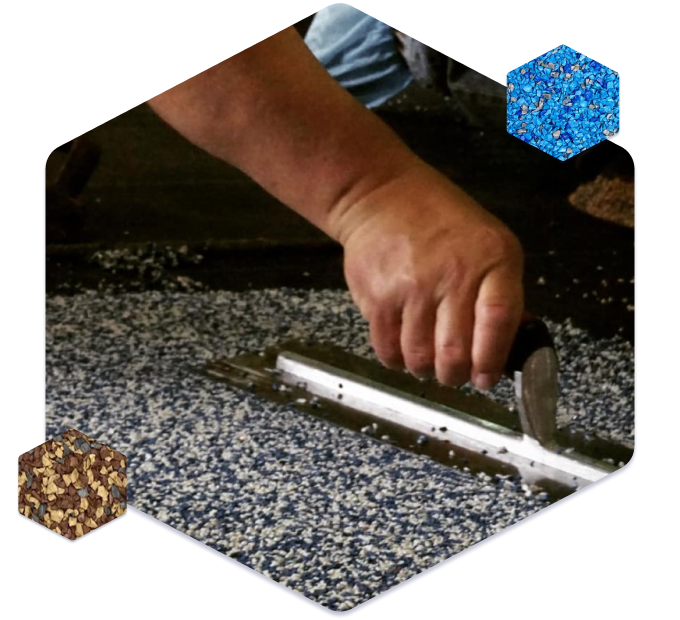Garage Rubber Flooring
Reshaping the world beneath your feet with our comfortable, durable, and stylish custom rubber overlays.

Garage rubber flooring offers a versatile and practical solution for garage spaces that demand durability and safety. Suitable for both residential and commercial settings, this type of flooring provides a robust alternative to traditional concrete and epoxy floors. With a range of styles and finishes available, garage rubber flooring is increasingly recognized for its blend of aesthetic appeal and functional benefits.

What is Garage Rubber Flooring?
Definition and Material Composition
Garage rubber flooring is composed of high-density rubber materials, designed to endure the harsh conditions often found in garage environments. Typically made from synthetic rubber or recycled rubber products, it is crafted to resist stains, impacts, and water, making it an ideal choice for areas with heavy foot traffic and equipment use.

Advantages of Choosing Rubber Flooring for Your Garage
Durability and Longevity
Rubber flooring is renowned for its resilience and ability to withstand the rigors of daily garage activities. Unlike concrete floors that can crack under extreme pressure or temperature changes, garage rubber flooring remains intact and functional. Its robust nature ensures a long lifespan, reducing the need for frequent replacements and thereby offering significant cost savings over time.
Maintenance and Cleaning
Keeping garage rubber flooring in top condition is straightforward and does not require specialized cleaning agents. The maintenance routine typically involves:
Regular sweeping to remove debris and dirt.
Mopping with mild soap and water to tackle any spills or stains.
Periodic deep cleaning using a scrubber if necessary to maintain its pristine appearance.
These simple steps help preserve the flooring’s quality and appearance, ensuring it continues to perform its protective role effectively.
Safety Features
Safety is paramount in any garage environment, and rubber flooring excels in providing a secure surface. Key safety features include:
- Slip Resistance: Rubber’s natural grip reduces the risk of slips and falls, even when the surface is wet.
- Shock Absorption: The elasticity of rubber helps cushion falls and eases the strain on joints and limbs, making it safer for prolonged standing or walking.
By addressing these critical safety concerns, garage rubber flooring ensures a safer workspace or home garage, enhancing both comfort and protection.

Installation Process of Garage Rubber Flooring
Preparing Your Garage
Proper preparation of the garage space is crucial for the successful installation of rubber flooring. Steps include:
- Cleaning the Floor: Ensure the existing garage floor is free of dirt, grease, and any debris.
- Checking for Evenness: The surface must be level to avoid uneven wear and potential hazards.
- Addressing Moisture Issues: If necessary, apply a moisture barrier to prevent dampness from affecting the rubber material.
These preparatory steps are essential for a smooth installation process and optimal performance of the flooring.
Post-Installation Care
After installing the rubber flooring, it is important to:
- Allow Ventilation: Ensure the space is well-ventilated to help disperse any odors from new rubber material.
- Inspect Seams and Edges: Check for any misalignments or gaps and address them promptly to ensure a seamless surface.
- Follow Specific Care Instructions: Depending on the type of rubber flooring installed, there may be additional care instructions to follow during the initial period.
Proper post-installation care helps in prolonging the life of the garage rubber flooring and maintaining its appearance and functionality.

Cost Analysis of Rubber Garage Flooring
Pricing Factors
The cost of garage rubber flooring can vary based on several factors, including:
- Material Quality: Higher-density rubber typically costs more but offers better durability and longevity.
- Thickness: Thicker rubber flooring provides better insulation and noise reduction but at a higher price point.
Understanding these factors helps in budgeting and choosing the right flooring solution that meets both needs and financial constraints.
Cost Comparison with Other Flooring Types
When compared to other types of garage flooring, rubber flooring presents a cost-effective option due to its low maintenance and longevity. Here’s how it stacks up against others:
- Concrete: Less expensive initially but may require more in terms of repairs and maintenance.
- Epoxy: Comparable in price but may be slicker and less durable under heavy use.
- Tiles: Ceramic or vinyl tiles might offer aesthetic diversity but often lack the same level of durability and shock absorption.
This comparison allows potential buyers to evaluate the best long-term flooring investment for their garage space.

Real-Life Garage Rubber Flooring Applications
Residential Garage Transformations
Rubber flooring has transformed numerous residential garages from basic storage spaces to functional, safe, and stylish areas. Homeowners often note improvements not just in aesthetics but also in usability, turning their garages into workshops, gyms, or recreational areas.
Commercial Success Stories
Commercial properties, including automotive workshops and retail spaces, have also benefited from the installation of rubber garage flooring. The durability and ease of maintenance are highly valued in high-traffic environments, contributing to safer working conditions and lower upkeep costs.
These real-life examples underline the versatility and practicality of rubber flooring in both residential and commercial settings.



